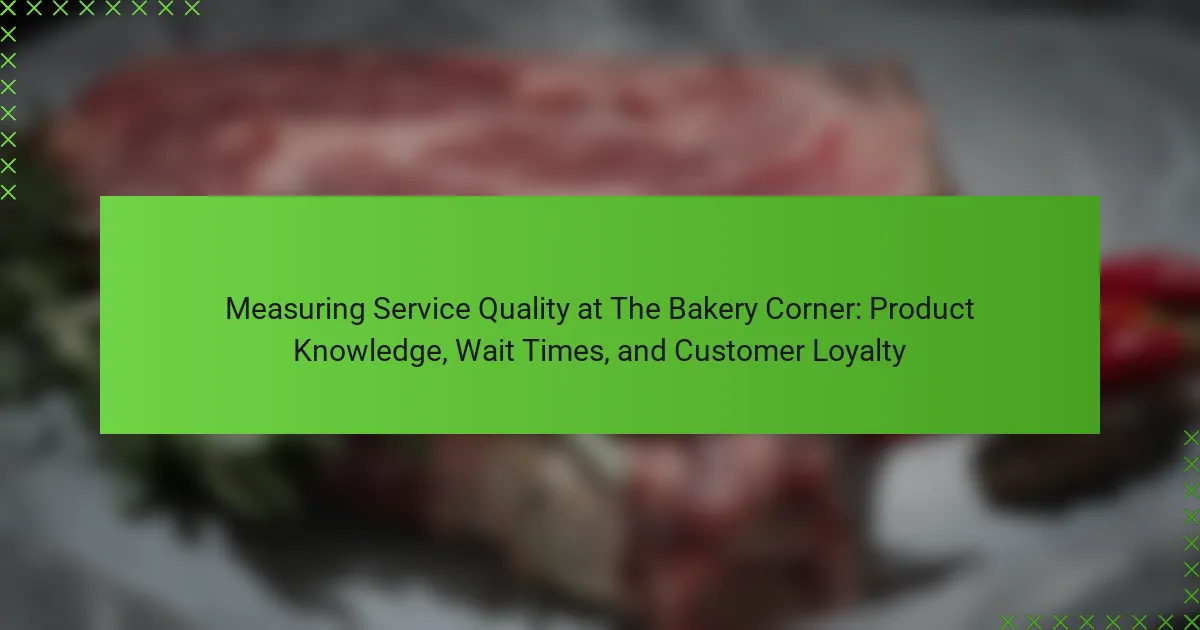
What is Service Quality at The Bakery Corner?
Service quality at The Bakery Corner refers to the overall experience customers have with its offerings. It encompasses various aspects such as product knowledge, wait times, and customer interactions. High service quality is indicated by staff being knowledgeable about products, which enhances customer satisfaction. Efficient wait times contribute positively to the overall experience, making customers more likely to return. Customer loyalty is often a direct result of consistently high service quality. Studies show that businesses with high service quality enjoy greater customer retention and positive word-of-mouth.
How is service quality defined in the context of a bakery?
Service quality in the context of a bakery is defined by the overall customer experience during their visit. It encompasses the freshness and taste of baked goods, as well as the efficiency of service. Key attributes include product knowledge of staff, wait times for orders, and the ambiance of the bakery. High service quality leads to increased customer satisfaction and loyalty. Research indicates that 70% of consumers consider service quality a critical factor in their decision to return to a bakery. This data supports the importance of maintaining high standards in service delivery.
What are the key dimensions of service quality?
The key dimensions of service quality are reliability, assurance, tangibles, empathy, and responsiveness. Reliability refers to the ability to perform the promised service dependably and accurately. Assurance involves the knowledge and courtesy of employees and their ability to inspire trust and confidence. Tangibles are the physical facilities, equipment, and appearance of personnel. Empathy is the provision of caring, individualized attention to customers. Responsiveness is the willingness to help customers and provide prompt service. These dimensions collectively influence customer perceptions of service quality and satisfaction.
How does service quality impact customer satisfaction?
Service quality significantly impacts customer satisfaction. High service quality leads to positive customer experiences. Customers are more likely to return when they feel valued. According to a study by Zeithaml et al. (1996), perceived service quality correlates directly with customer satisfaction levels. Satisfied customers often become loyal patrons. They also tend to recommend the business to others. In contrast, poor service quality can lead to dissatisfaction. This dissatisfaction can result in negative reviews and loss of customers. Therefore, maintaining high service quality is essential for customer satisfaction and retention.
Why is measuring service quality important for The Bakery Corner?
Measuring service quality is important for The Bakery Corner because it directly impacts customer satisfaction and loyalty. High service quality leads to positive customer experiences. This, in turn, encourages repeat business and referrals. According to a study by the American Customer Satisfaction Index, businesses with high service quality see a 10-20% increase in customer retention. Additionally, understanding service quality helps identify areas for improvement. It allows The Bakery Corner to enhance product knowledge and reduce wait times. This focus on quality can differentiate The Bakery Corner from competitors. Ultimately, measuring service quality is essential for sustained success and growth.
What are the potential benefits of high service quality?
High service quality leads to increased customer satisfaction. Satisfied customers are more likely to return for repeat purchases. According to a study by the American Customer Satisfaction Index, a 1% increase in customer satisfaction can lead to a 3% increase in revenue. High service quality also enhances brand reputation. Positive experiences encourage customers to share their experiences with others. This word-of-mouth marketing can attract new customers. Additionally, high service quality reduces operational costs. Efficient service processes minimize errors and the need for refunds. Overall, high service quality fosters customer loyalty and drives business growth.
How does service quality influence customer loyalty?
Service quality significantly influences customer loyalty. High service quality leads to increased customer satisfaction. Satisfied customers are more likely to return for repeat business. According to a study by Zeithaml et al. (1996), perceived service quality directly affects customer retention. Additionally, customers who experience excellent service often share their positive experiences. This word-of-mouth can attract new customers. Consequently, consistent service quality fosters a loyal customer base. In the context of The Bakery Corner, product knowledge and reduced wait times enhance service quality. These factors contribute to a positive customer experience, strengthening loyalty.

What role does Product Knowledge play in Service Quality?
Product knowledge significantly enhances service quality. Employees with comprehensive product knowledge can provide accurate information and recommendations. This expertise increases customer satisfaction and trust. A study by Parasuraman et al. (1988) identified that knowledgeable staff positively impacts perceived service quality. Customers feel valued when staff can answer questions and address concerns effectively. This leads to higher loyalty and repeat business. Consequently, product knowledge is essential for improving overall service quality at establishments like The Bakery Corner.
How can product knowledge enhance customer experience?
Product knowledge enhances customer experience by enabling staff to provide accurate information and recommendations. When employees understand the products, they can answer questions confidently. This leads to increased customer trust and satisfaction. Knowledgeable staff can tailor suggestions based on customer preferences. A study by the American Society for Training and Development found that effective product training increases sales by 20%. Furthermore, informed employees can resolve issues more efficiently, reducing wait times. This contributes to a smoother shopping experience. Overall, product knowledge is essential for fostering customer loyalty and positive interactions.
What types of product knowledge are essential for staff?
Essential types of product knowledge for staff include ingredient knowledge, preparation methods, and product benefits. Ingredient knowledge allows staff to inform customers about allergens and dietary concerns. Understanding preparation methods enables staff to describe cooking techniques and freshness. Knowledge of product benefits helps staff highlight unique selling points. This knowledge is vital for enhancing customer satisfaction and loyalty. A study by the National Restaurant Association indicates that informed staff can significantly improve customer experience and retention rates.
How does product knowledge affect customer decision-making?
Product knowledge significantly influences customer decision-making. Customers with high product knowledge are more likely to make informed choices. They understand the features and benefits of products better. This understanding reduces uncertainty during the purchasing process. Studies show that informed customers exhibit greater confidence in their decisions. For instance, a survey by the National Retail Federation found that 73% of consumers prefer knowledgeable sales associates. This preference highlights the importance of product knowledge in enhancing customer satisfaction and loyalty.
Why is ongoing training important for product knowledge?
Ongoing training is important for product knowledge because it ensures employees remain informed about product updates and changes. This knowledge directly impacts their ability to assist customers effectively. Employees who are well-trained can provide accurate information, leading to increased customer satisfaction. Research shows that informed staff can boost sales by up to 20%. Regular training sessions help reinforce product features and benefits. This continuous learning fosters confidence in employees, enhancing their interaction with customers. Moreover, ongoing training helps to address any misconceptions about products. Overall, it is essential for maintaining high service quality and customer loyalty.
What training methods are most effective for improving product knowledge?
Interactive training methods are most effective for improving product knowledge. These methods include hands-on workshops and role-playing scenarios. They engage employees actively, enhancing retention of information. Studies show that experiential learning increases understanding of product details. For instance, a study by the Association for Talent Development found that interactive training improves knowledge retention by up to 75%. Additionally, regular product training sessions keep staff updated on new offerings. This ongoing education fosters confidence in employees when interacting with customers. Overall, interactive training methods are proven to significantly enhance product knowledge among staff.
How can The Bakery Corner assess staff product knowledge?
The Bakery Corner can assess staff product knowledge through regular quizzes and training sessions. Quizzes can test employees on product ingredients, preparation methods, and health benefits. Training sessions can provide comprehensive information about new products and seasonal offerings. Role-playing scenarios can simulate customer interactions, allowing staff to demonstrate their knowledge. Feedback from these activities can highlight areas for improvement. Additionally, customer feedback can be analyzed to gauge staff effectiveness in communicating product knowledge. All these methods contribute to a well-rounded assessment of staff product knowledge.

How do Wait Times impact Service Quality?
Wait times significantly impact service quality by influencing customer satisfaction and perceptions. Longer wait times can lead to frustration and dissatisfaction among customers. Research indicates that a wait time exceeding 5 minutes can result in a negative experience for 70% of customers. Conversely, shorter wait times often enhance customer perceptions of service efficiency. A study by the Journal of Service Research found that perceived wait times are more critical than actual wait times in shaping customer satisfaction. Effective management of wait times can improve overall service quality and customer loyalty.
What factors contribute to wait times in a bakery setting?
Factors that contribute to wait times in a bakery setting include customer volume, order complexity, and staff efficiency. High customer volume can lead to longer wait times as more orders are processed simultaneously. The complexity of orders, such as custom cakes or specialty items, requires more time to prepare, increasing wait times. Additionally, staff efficiency plays a crucial role; well-trained staff can serve customers faster, reducing wait times. Equipment availability also affects wait times; malfunctioning or inadequate equipment can slow down production. Lastly, peak hours, such as mornings or holidays, typically see increased wait times due to higher demand.
How can efficient service reduce perceived wait times?
Efficient service can significantly reduce perceived wait times. When customers experience quick and effective service, they feel their time is valued. This perception is enhanced by clear communication from staff about wait times. For instance, if a customer is informed of a brief wait, they are less likely to feel frustrated. Studies show that perceived wait times can be reduced by up to 50% with effective service strategies. Additionally, engaging customers during the wait, such as through friendly conversation or updates, can distract them from the wait itself. Overall, efficient service creates a positive experience that minimizes the feeling of waiting.
What are the consequences of long wait times on customer satisfaction?
Long wait times negatively impact customer satisfaction. Customers often feel frustrated and undervalued during extended waits. This frustration can lead to decreased loyalty and repeat visits. Research indicates that 70% of customers cite wait times as a primary reason for dissatisfaction. Additionally, prolonged waits can diminish the overall perception of service quality. Customers may associate longer wait times with poor management and inefficiency. This perception can harm the bakery’s reputation in the community. Ultimately, long wait times can result in lost sales and reduced customer retention.
How can The Bakery Corner effectively manage wait times?
The Bakery Corner can effectively manage wait times by implementing a queue management system. This system can track customer flow and predict peak hours. Additionally, staff training on efficient service techniques can reduce service time. Offering pre-order options can also minimize in-store wait times. Furthermore, displaying estimated wait times can enhance customer satisfaction. Research shows that transparency about wait times leads to improved customer experiences. A study by the Journal of Service Research found that customers appreciate knowing how long they will wait.
What strategies can be implemented to minimize wait times?
Implementing efficient scheduling and staffing strategies can significantly minimize wait times. Analyzing peak hours helps allocate sufficient staff during busy periods. Utilizing technology, such as queue management systems, streamlines customer flow. Training employees to enhance service speed improves overall efficiency. Offering pre-order options allows customers to bypass lines. Implementing self-service kiosks can reduce bottlenecks at counters. Regularly reviewing and adjusting processes based on customer feedback ensures continuous improvement. According to a study by the National Restaurant Association, effective queue management can reduce perceived wait times by up to 30%.
How can technology assist in reducing wait times?
Technology can assist in reducing wait times by streamlining service processes. Automated ordering systems enable customers to place orders without waiting in line. Mobile apps allow pre-ordering, which shortens in-store wait times. Queue management software helps manage customer flow effectively. Digital payment options speed up transaction times. Self-service kiosks reduce reliance on staff, increasing efficiency. Real-time inventory tracking ensures product availability, minimizing delays. Data analytics can predict peak times, allowing better staffing and resource allocation. These technological solutions enhance overall customer experience by reducing wait times significantly.

What is the relationship between Service Quality and Customer Loyalty?
Service quality directly influences customer loyalty. High service quality leads to increased customer satisfaction. Satisfied customers are more likely to return. They also tend to recommend the service to others. Research shows that a 1% increase in service quality can boost customer loyalty by 2%. This correlation is evident in various industries, including food and beverage. For example, a study by Zeithaml et al. (1996) found that perceived service quality significantly impacts customer retention rates. Therefore, improving service quality is crucial for fostering long-term customer loyalty.
How does service quality influence repeat business?
Service quality significantly influences repeat business by affecting customer satisfaction and loyalty. High service quality leads to positive customer experiences. Satisfied customers are more likely to return for future purchases. According to a study by Zeithaml, Bitner, and Gremler, 70% of customers cite service quality as a key factor in their decision to return. Additionally, businesses with high service quality see increased word-of-mouth referrals. This creates a cycle where excellent service attracts new customers while retaining existing ones. Thus, maintaining high service quality is essential for fostering repeat business.
What role does customer feedback play in enhancing service quality?
Customer feedback plays a crucial role in enhancing service quality. It provides businesses with direct insights into customer experiences and expectations. By analyzing feedback, companies can identify areas for improvement. This helps in tailoring services to meet customer needs more effectively. For example, a study by the American Customer Satisfaction Index found that companies with high customer feedback engagement saw a 10% increase in service quality ratings. Implementing changes based on feedback leads to higher customer satisfaction and loyalty. Thus, customer feedback is essential for continuous service enhancement and overall business success.
How can The Bakery Corner foster a loyal customer base?
The Bakery Corner can foster a loyal customer base by enhancing service quality. Providing knowledgeable staff ensures customers receive accurate information about products. Shortening wait times improves customer satisfaction during peak hours. Implementing a loyalty program encourages repeat visits and rewards frequent customers. Regularly seeking customer feedback helps identify areas for improvement. High-quality products consistently meet customer expectations, leading to positive experiences. Building a community through events or workshops encourages customer engagement. These strategies collectively contribute to customer loyalty and retention.
What are the best practices for building customer loyalty through service quality?
The best practices for building customer loyalty through service quality include consistently delivering high-quality service, training staff effectively, and actively seeking customer feedback. High-quality service fosters positive experiences, which leads to repeat business. Staff training ensures employees are knowledgeable and can assist customers confidently. Actively seeking feedback allows businesses to identify areas for improvement and adapt to customer needs. According to a study by the American Customer Satisfaction Index, companies that prioritize service quality see a 20% increase in customer retention. This demonstrates that effective service quality practices directly correlate with enhanced customer loyalty.
How can personalized service enhance customer loyalty?
Personalized service enhances customer loyalty by creating unique experiences tailored to individual preferences. This approach fosters emotional connections between customers and the brand. When customers feel valued, they are more likely to return. Research shows that 80% of consumers are more likely to make a purchase when brands offer personalized experiences. Additionally, personalized service can lead to increased customer satisfaction and trust. Satisfied customers tend to share their positive experiences, further promoting brand loyalty. In summary, personalized service directly influences customer retention through meaningful engagement and satisfaction.
What loyalty programs can The Bakery Corner implement to reward customers?
The Bakery Corner can implement a points-based loyalty program to reward customers. Customers earn points for each purchase made. Points can be redeemed for discounts or free products. This encourages repeat visits and increases customer retention. Another option is a tiered loyalty program. Customers achieve different levels based on their spending. Higher tiers offer exclusive benefits like early access to new products. A referral program can also be effective. Customers receive rewards for referring friends who make purchases. This expands the customer base while rewarding loyal patrons. Additionally, The Bakery Corner can offer birthday rewards. Customers receive a special treat or discount during their birthday month. This personal touch enhances customer satisfaction and loyalty.
What practical steps can The Bakery Corner take to improve overall service quality?
The Bakery Corner can improve overall service quality by implementing staff training programs. Training enhances product knowledge among employees. Knowledgeable staff can provide accurate information to customers. This builds trust and increases customer satisfaction.
Additionally, The Bakery Corner should streamline order processing systems. Efficient systems reduce wait times for customers. Shorter wait times correlate with higher customer retention rates.
Regularly collecting customer feedback is also essential. Feedback helps identify areas needing improvement. Addressing customer concerns leads to better service experiences.
Lastly, maintaining a clean and inviting atmosphere is crucial. A pleasant environment enhances the overall dining experience. Positive experiences encourage repeat visits and customer loyalty.
The Bakery Corner is the primary entity focused on in this article, which examines the critical aspects of service quality, including product knowledge, wait times, and their impact on customer loyalty. The article outlines how high service quality enhances customer satisfaction and retention, emphasizing the importance of knowledgeable staff and efficient service processes. It also discusses the dimensions of service quality, the relationship between service quality and customer loyalty, and practical steps The Bakery Corner can take to improve overall service quality. By measuring these factors, The Bakery Corner can foster a loyal customer base and drive business growth.
